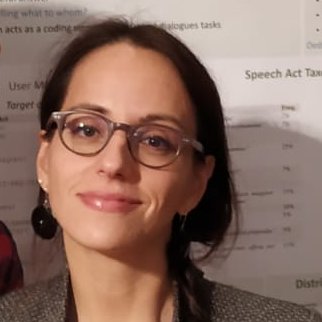Third International Workshop on Affective Computing in Requirements Engineering
A fully virtual workshop in conjunction with RE’20 on September 1, 2020.
Workshop Program
The duration of invited talks and paper presentations include 10min for questions; detailed discussions can be continued in the second half of the workshop. All times are stated in Zurich local time (CEST). All registered participants received information on how to participate in the virtual event.
| 10:30 - 12:00 |
Session 1
Chair: Jan Ole Johanssen |
| 10:30 15min |
Welcome by the Organizers |
| 10:45 30min |
Recognizing the Emotions of Software Developers while Programming Nicole Novielli (University of Bari, Italy) Invited talk, more information. |
| 11:15 25min |
Design of a Remote Emotional Requirements Elicitation Feedback Method Eric Jackson and Alexander Norta Paper presentation. |
| 11:40 20min |
Affecting Mood, Motivation and Productivity in Requirements Engineering Meetings and Beyond: A Research Vision Jil Klünder, Oliver Karras and Kurt Schneider Paper presentation, preprint online. |
| Break (1h) | |
| 13:00 - 14:30 |
Session 2
Chairs: Kuldar Taveter, Jan Ole Johanssen, James Tizard |
| 13:00 30min |
What can Requirements Engineering learn about emotions from Psychology and Design? Leon Sterling (Swinburne University of Technology, Australia) Invited talk, more information. |
| 13:30 30min |
Discussion Round 1 Future Directions of Research in Affective Computing in Requirements Engineering |
| 14:00 30min |
Discussion Round 2 Summary and Collaboration Opportunities |
Registration
Please register using the RE'20 registration site to participate in the AffectRE'20 workshop.
Invited Talks
The AffectRE workshop will include two invited talks.
What can Requirements Engineering learn about emotions from Psychology and Design?
Invited Talk by Leon Sterling (Swinburne University of Technology, Australia) Summary: How people feel about a technology/system greatly affects whether the technology will be successfully adopted. The need to focus on emotional requirements has been recognised recently. This talk will share experiences on the need for emotions in requirements engineering and how to elicit emotions when develop systems. It will also discuss theories from psychology on how emotions are made, and design thinking relevant to how emotions are built into products. Short Bio: Professor Leon Sterling has had a distinguished academic career. He spent 15 years at universities in the UK, Israel and the United States following a PhD at ANU before returning to Australia. After 15 years at the University of Melbourne, including time as Adacel Professor of Software Innovation and Engineering and Director of e-Research, he moved to Swinburne University of Technology as Dean of the Faculty of Information and Communication Technologies in 2010 and later served as Pro Vice-Chancellor (Digital Frontiers). His current research area is incorporating emotions in technology design, especially software.
Short Bio: Professor Leon Sterling has had a distinguished academic career. He spent 15 years at universities in the UK, Israel and the United States following a PhD at ANU before returning to Australia. After 15 years at the University of Melbourne, including time as Adacel Professor of Software Innovation and Engineering and Director of e-Research, he moved to Swinburne University of Technology as Dean of the Faculty of Information and Communication Technologies in 2010 and later served as Pro Vice-Chancellor (Digital Frontiers). His current research area is incorporating emotions in technology design, especially software.
Recognizing the Emotions of Software Developers while Programming
Invited Talk by Nicole Novielli (University of Bari, Italy) Summary: Software development is an intellectual activity requiring creativity and problem-solving skills, which are known to be influenced by emotions. Developers experience a wide range of affective states during programming tasks, which may have an impact on their job performance and wellbeing. Early recognition of negative emotions, such as stress or frustration can enable just-in-time intervention for developers and team managers, in order to prevent burnout and undesired turnover. In this talk, I will present an overview of recent research findings of our empirical studies aimed at investigating the link between emotion and productivity, understanding the triggers for developers’ emotions, and the strategies they implement to deal with negative ones and restore positive feelings. Furthermore, I will present the results of a machine learning study aimed at identifying the minimal set of non-invasive biometric sensors for emotion recognition during programming tasks, i.e. using only a wristband capturing the electrodermal activity and heart-related metrics. Short Bio: Nicole Novielli is an Assistant Professor at the University of Bari, where she received a Ph.D. in Computer Science in 2010. Her research interests lie at the intersection of software engineering and affective computing with a specific focus on emotion mining from software repositories, natural language processing of developers’ communication traces, and recognition of developers’ emotions based on biometrics. In 2016, she started the ICSE workshop series on Emotion Awareness in Software Engineering.
Short Bio: Nicole Novielli is an Assistant Professor at the University of Bari, where she received a Ph.D. in Computer Science in 2010. Her research interests lie at the intersection of software engineering and affective computing with a specific focus on emotion mining from software repositories, natural language processing of developers’ communication traces, and recognition of developers’ emotions based on biometrics. In 2016, she started the ICSE workshop series on Emotion Awareness in Software Engineering.